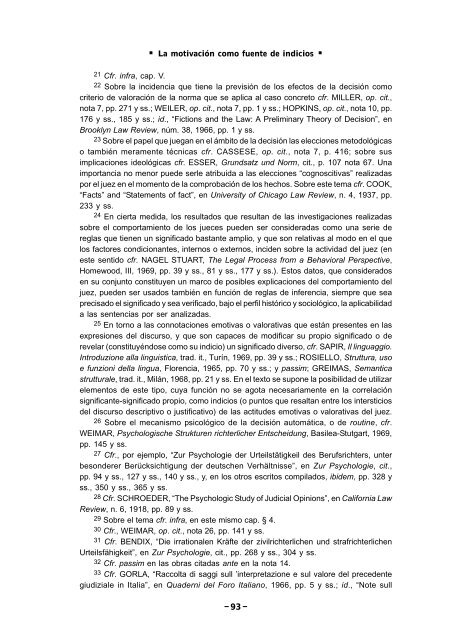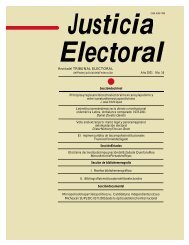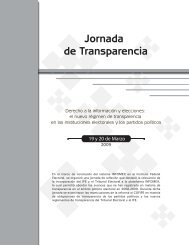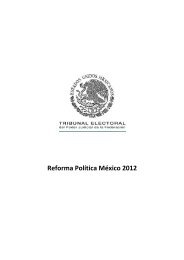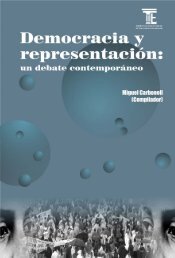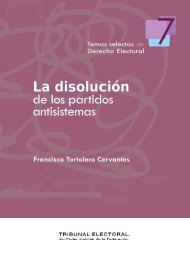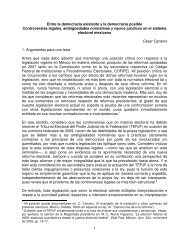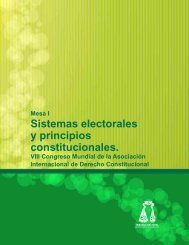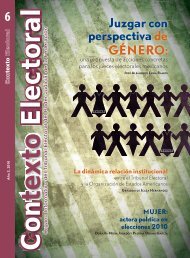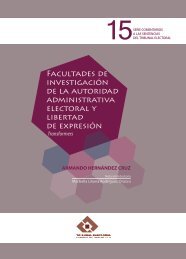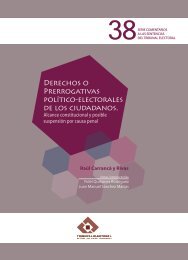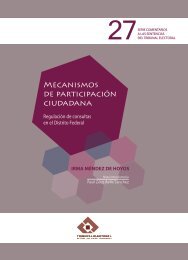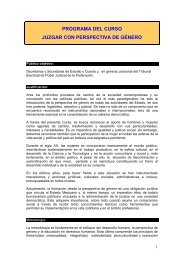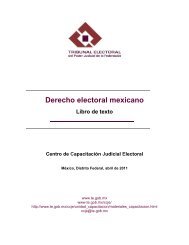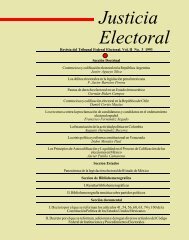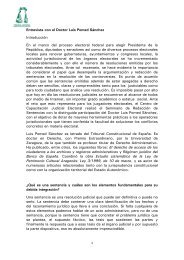La Motivación de la Sentencia Civil - Tribunal Electoral del Poder ...
La Motivación de la Sentencia Civil - Tribunal Electoral del Poder ...
La Motivación de la Sentencia Civil - Tribunal Electoral del Poder ...
Create successful ePaper yourself
Turn your PDF publications into a flip-book with our unique Google optimized e-Paper software.
<strong>La</strong> motivación como fuente <strong>de</strong> indicios<br />
21 Cfr. infra, cap. V.<br />
22 Sobre <strong>la</strong> inci<strong>de</strong>ncia que tiene <strong>la</strong> previsión <strong>de</strong> los efectos <strong>de</strong> <strong>la</strong> <strong>de</strong>cisión como<br />
criterio <strong>de</strong> valoración <strong>de</strong> <strong>la</strong> norma que se aplica al caso concreto cfr. MILLER, op. cit.,<br />
nota 7, pp. 271 y ss.; WEILER, op. cit., nota 7, pp. 1 y ss.; HOPKINS, op. cit., nota 10, pp.<br />
176 y ss., 185 y ss.; id., “Fictions and the <strong>La</strong>w: A Preliminary Theory of Decision”, en<br />
Brooklyn <strong>La</strong>w Review, núm. 38, 1966, pp. 1 y ss.<br />
23 Sobre el papel que juegan en el ámbito <strong>de</strong> <strong>la</strong> <strong>de</strong>cisión <strong>la</strong>s elecciones metodológicas<br />
o también meramente técnicas cfr. CASSESE, op. cit., nota 7, p. 416; sobre sus<br />
implicaciones i<strong>de</strong>ológicas cfr. ESSER, Grundsatz und Norm, cit., p. 107 nota 67. Una<br />
importancia no menor pue<strong>de</strong> serle atribuida a <strong>la</strong>s elecciones “cognoscitivas” realizadas<br />
por el juez en el momento <strong>de</strong> <strong>la</strong> comprobación <strong>de</strong> los hechos. Sobre este tema cfr. COOK,<br />
“Facts” and “Statements of fact”, en University of Chicago <strong>La</strong>w Review, n. 4, 1937, pp.<br />
233 y ss.<br />
24 En cierta medida, los resultados que resultan <strong>de</strong> <strong>la</strong>s investigaciones realizadas<br />
sobre el comportamiento <strong>de</strong> los jueces pue<strong>de</strong>n ser consi<strong>de</strong>radas como una serie <strong>de</strong><br />
reg<strong>la</strong>s que tienen un significado bastante amplio, y que son re<strong>la</strong>tivas al modo en el que<br />
los factores condicionantes, internos o externos, inci<strong>de</strong>n sobre <strong>la</strong> actividad <strong>de</strong>l juez (en<br />
este sentido cfr. NAGEL STUART, The Legal Process from a Behavioral Perspective,<br />
Homewood, III, 1969, pp. 39 y ss., 81 y ss., 177 y ss.). Estos datos, que consi<strong>de</strong>rados<br />
en su conjunto constituyen un marco <strong>de</strong> posibles explicaciones <strong>de</strong>l comportamiento <strong>de</strong>l<br />
juez, pue<strong>de</strong>n ser usados también en función <strong>de</strong> reg<strong>la</strong>s <strong>de</strong> inferencia, siempre que sea<br />
precisado el significado y sea verificado, bajo el perfil histórico y sociológico, <strong>la</strong> aplicabilidad<br />
a <strong>la</strong>s sentencias por ser analizadas.<br />
25 En torno a <strong>la</strong>s connotaciones emotivas o valorativas que están presentes en <strong>la</strong>s<br />
expresiones <strong>de</strong>l discurso, y que son capaces <strong>de</strong> modificar su propio significado o <strong>de</strong><br />
reve<strong>la</strong>r (constituyéndose como su indicio) un significado diverso, cfr. SAPIR, Il linguaggio.<br />
Introduzione al<strong>la</strong> linguistica, trad. it., Turín, 1969, pp. 39 y ss.; ROSIELLO, Struttura, uso<br />
e funzioni <strong>de</strong>l<strong>la</strong> lingua, Florencia, 1965, pp. 70 y ss.; y passim; GREIMAS, Semantica<br />
strutturale, trad. it., Milán, 1968, pp. 21 y ss. En el texto se supone <strong>la</strong> posibilidad <strong>de</strong> utilizar<br />
elementos <strong>de</strong> este tipo, cuya función no se agota necesariamente en <strong>la</strong> corre<strong>la</strong>ción<br />
significante-significado propio, como indicios (o puntos que resaltan entre los intersticios<br />
<strong>de</strong>l discurso <strong>de</strong>scriptivo o justificativo) <strong>de</strong> <strong>la</strong>s actitu<strong>de</strong>s emotivas o valorativas <strong>de</strong>l juez.<br />
26 Sobre el mecanismo psicológico <strong>de</strong> <strong>la</strong> <strong>de</strong>cisión automática, o <strong>de</strong> routine, cfr.<br />
WEIMAR, Psychologische Strukturen richterlicher Entscheidung, Basilea-Stutgart, 1969,<br />
pp. 145 y ss.<br />
27 Cfr., por ejemplo, “Zur Psychologie <strong>de</strong>r Urteilstätigkeil <strong>de</strong>s Berufsrichters, unter<br />
beson<strong>de</strong>rer Berücksichtigung <strong>de</strong>r <strong>de</strong>utschen Verhältnisse”, en Zur Psychologie, cit.,<br />
pp. 94 y ss., 127 y ss., 140 y ss., y, en los otros escritos compi<strong>la</strong>dos, ibi<strong>de</strong>m, pp. 328 y<br />
ss., 350 y ss., 365 y ss.<br />
28 Cfr. SCHROEDER, “The Psychologic Study of Judicial Opinions”, en California <strong>La</strong>w<br />
Review, n. 6, 1918, pp. 89 y ss.<br />
29 Sobre el tema cfr. infra, en este mismo cap. § 4.<br />
30 Cfr., WEIMAR, op. cit., nota 26, pp. 141 y ss.<br />
31 Cfr. BENDIX, “Die irrationalen Kräfte <strong>de</strong>r zivilrichterlichen und strafrichterlichen<br />
Urteilsfähigkeit”, en Zur Psychologie, cit., pp. 268 y ss., 304 y ss.<br />
32 Cfr. passim en <strong>la</strong>s obras citadas ante en <strong>la</strong> nota 14.<br />
33 Cfr. GORLA, “Raccolta di saggi sull ’interpretazione e sul valore <strong>de</strong>l prece<strong>de</strong>nte<br />
giudiziale in Italia”, en Qua<strong>de</strong>rni <strong>de</strong>l Foro Italiano, 1966, pp. 5 y ss.; id., “Note sull<br />
93


